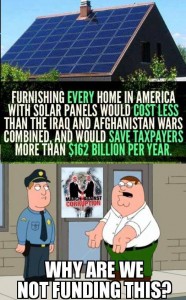Have you seen the meme suggesting that placing solar panels on everyone’s house would cost less than the Iraq/Afghanistan wars and save taxpayers billions?
 I don’t usually respond to memes, but I crunched the numbers on this one anyway, so I figured I would post the results. So how much power could actually be generated by plastering solar panels on the rooftops of every home in the United States? Well, first we need to see how many houses there are. As of 2006 there were roughly 125,000,000 houses in the United States [1]. This figure most likely hasn’t changed all that much because of the housing market collapse, so let’s go with that figure plus 10% just to be on the safe side.
I don’t usually respond to memes, but I crunched the numbers on this one anyway, so I figured I would post the results. So how much power could actually be generated by plastering solar panels on the rooftops of every home in the United States? Well, first we need to see how many houses there are. As of 2006 there were roughly 125,000,000 houses in the United States [1]. This figure most likely hasn’t changed all that much because of the housing market collapse, so let’s go with that figure plus 10% just to be on the safe side.
Figures
Okay, now how large a system do we want to install on each house? Let’s go with a a 5 kilowatt system. That’s a decent size. How much would that cost? At the low end, it would cost roughly $25,000 and that isn’t even a grid tied system [2]. But how much electricity could that produce over the course of a year? Well, that depends on your location and on the weather, but a good estimate is 850 kilowatt-hours per year per kilowatt. So a 5 kilowatt system would produce, on average 4250 kilowatt-hours worth of electricity per year.
Energy Production
So how much is that? Here’s the math: 4250 kilowatt-hours/house * (125,000,000 houses * 1.1) = 584,375 gigawatt-hours. At $0.15/kilowatt-hour that’s roughly $87B a year. That certainly is not a bad amount, but also far less than the meme suggests. In addition, these savings assume that all electricity generated at peak hours is used. This is only going to be the case in a very large house or in a grid tied system, but I wanted to use the lowest price that I could to show just how absurd the meme is.
Cost
Now, how much would this system cost to implement? At $25,000 each, it would cost the taxpayers roughly $3.125 trillion. This makes a lot of assumptions. One is that the government doesn’t add to the cost, as it usually does. Another is that the low range is a reasonable estimate for the cost of the system. It really isn’t. This does not take into account the added cost of a grid tied system.
Conclusion
But is that more or less than the combined cost of the Iraq and Afghanistan wars? Well, that really depends on who you ask. The figures vary so widely that it’s difficult to get a decent estimate. Some of the sources estimate that the total cost will be somewhere in the $4T – $6T range while others say that it’s under $2T. So depending on what source you believe, the system MAY cost less than the sum total of these wars. So wait, is the meme accurate? Well, it’s not as far off as I originally thought, but it certainly uses highly inflated estimates. After all, I made assumptions that drove my results closer to the estimate and the savings still came out far less than the meme’s.
Finally, here’s a reality check. 584,375 kilowatt hours seems like a lot of electricity, and it is. But the US consumes a lot more than that. In fact, it consumes roughly 4,686,400 gigawatt-hours of electricity per year, which itself is only a fraction of the total energy consumption (roughly 28 million gigawatt hours). So as energy as $3.125 trillion dollars worth of solar panels would produce, it would only be about 13% of electricity consumption and only about 2% of the United States’ total energy consumption.
Is it worth it? Well, it would certainly be preferable to waging endless wars, but the reality is that the money would be best spent by paying off the national debt or reducing taxes. That would produce the largest bang for the buck.

